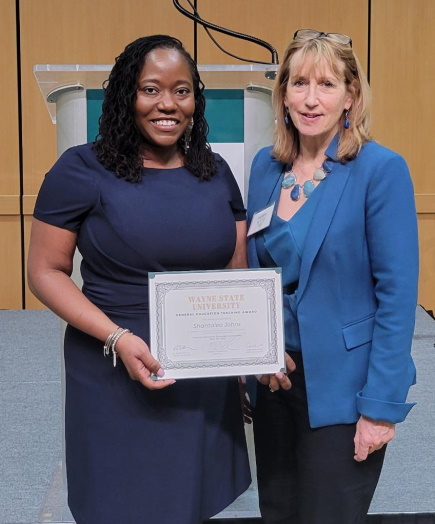Social Work faculty member recognized for excellence in Gen Ed teaching
Teaching general education classes, which are open to all levels of learners and students across the university can be a challenging yet unique opportunity for Wayne State University (WSU) faculty. WSU School of Social Work Assistant Professor – Teaching Shantalea Johns, Ed.D., has risen to that challenge and was recently recognized by the university with a General Education Teaching Award.

The General Education Teaching Award recognizes instructors who have demonstrated commitment and excellence in supporting the General Education Program through teaching inside and outside the classroom. Three annual awards are presented to outstanding instructors who demonstrate a commitment to the academic mission of the university through collaboration, innovation, excellence, and inclusion in general education teaching.
A first-generation college student, Johns is a native Detroiter committed to the power of education and its ability to change lives. Having spent 10 years as an academic advisor prior to her transition to faculty and director of the Social Work Office of Continuing Education, Johns has the unique perspective of working directly with students throughout their academic journey. Johns holds eight degrees and certifications including a B.S.W., M.S.W., Graduate Certificate in College and University Teaching, and Doctor of Education in Educational Leadership and Policy Studies from WSU. In addition, she earned a Certificate in Mixed Methods Research from the University of Michigan, became a Certified Child and Adolescent trauma professional via the International Trauma Training Institute, serves as a Certified Youth, Adult, Higher Education, Public Safety, and Fire and EMS Mental Health First Aid Instructor for the National Council for Behavioral Health, and obtained a Telehealth Certification from Old Dominion University.
Johns teaches SW 1010 Introduction to Social Work and Social Welfare to students from schools and colleges across campus. SW 1010 fulfills the university’s diversity, equity, and inclusion (DEI) requirement and has become a sought-after course for those looking to expand their knowledge of the social work field and issues of fairness in economic, political and social systems. Johns weaves DEI concepts throughout the course, creating a classroom environment that values integrity, intellect, diversity and respect for each other and the environment. “My students learn how differences shape life experiences through service-learning projects and attendance at community events. One assignment, to attend a local city council meeting, provides them with the opportunity to learn about social policy and DEI issues at a local level. Students report back to the class the policies enacted at the meeting, which often results in high energy discussions of ways leaders can prioritize the wellbeing and access to opportunities for all community members. This type of assignment encourages students to be autonomous thinkers and active citizens.”
Johns’ commitment to diversity in teaching was also recently recognized by the Council on Social Work Education (CSWE) Center for Diversity and Social & Economic Justice in collaboration with the Katherine A. Kendall Institute for International Social Work Education and CSWE as an inaugural member of the CSWE cohort of Scholars in Global & Intercultural Competence. Johns will join fellow scholars to form a community of educators integrating global and intercultural competence into social work courses using an innovative curricular model developed by the Center and Words Without Borders Campus. Specifically, Johns will develop an immersive educational experience in which SW 1010 students who are already studying alongside students from different countries, cultures, and socioeconomic backgrounds build their knowledge of the diversity of our global community and learn how to bring about change at the community and global levels.
To promote safety, trustworthiness, transparency, voice, and choice within SW 1010, Johns employs SAMHSA’s six principles of trauma-informed care. “I use platforms including Voice Thread, an interactive PowerPoint platform, to provide an outlet for small group case discussion and employ a jigsaw teaching method to reduce student workload and increase collaborative learning.” Johns-student centered approach allows students to reflect on how their own experiences connect publicly and/or privately with their coursework and practice.
In support of healthy learning experiences across campus, Johns has provided multiple workshops on behalf of the WSU Office of Teaching and Learning on the integration of trauma-informed principles in the classroom. “I use a trauma-responsive approach to create belongingness for students from various backgrounds and life experiences. This involves the facilitation of connections to meet the individual needs of my students, such as structured mentorship for first-generation and Black students looking to expand their networks and navigate the academic landscape.” Johns also teaches coping skills to nurture hope and grit in students who may not be aware of the importance of self-care and trauma triggers that may occur in the classroom.
I am humbled and honored to receive this award. I look forward to growing as a general education instructor and continuing to watch how the general education program positively changes the lives of undergraduate students at Wayne State. - Shantalea Johns, Ed.D.
Johns recently shared tips and best practices for creating and supporting inclusive classrooms at the Engaging Gen Ed Symposium – Teaching Tips Roundtable on April 25, 2022. Additionally, Johns accepted her Ged Ed Award on April 28, 2022 at the Academic Recognition Awards Ceremony, which recognized outstanding faculty and academic staff for their contributions to the university, academic community and pursuit of professional interests.